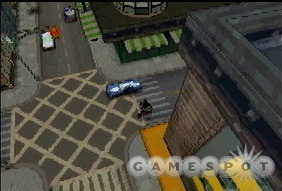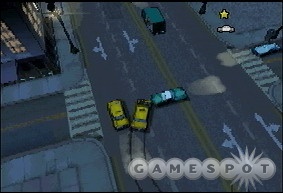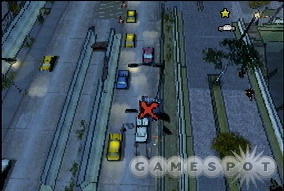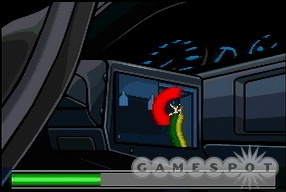At first glance, Chinatown Wars could be mistaken for a return to the Grand Theft Auto series' humble 2D beginnings. The action is viewed from a more or less top-down perspective, and of course you still spend much of your time driving stolen cars and causing trouble with firearms. But the similarities between this superb Nintendo DS game and its '90s progenitors pretty much end there. Chinatown Wars actually has more in common with GTAs III and IV than it does with earlier games, and, remarkably, it even adds to and improves on the formula that made those games so successful. That's a bold statement for sure, but Chinatown Wars really is that good.

Set in the same instantly recognizable Liberty City as GTAIV (minus one island), Chinatown Wars tells the story of a power struggle within the Triad gangs from the perspective of Huang Lee, whose crime-boss father has recently been murdered. Huang flies to Liberty from Hong Kong to avenge his father, and predictably becomes embroiled in the war between those hoping to step into the dead man's shoes. As Huang, you advance the story--which should take you about nine hours to play through--by undertaking missions for a number of different characters within the Triad organization, as well as for one or two people outside of it. Many of these missions involve the usual mix of driving fast, killing people, and not getting caught by the cops, but there are plenty of varied and memorable missions as well, a number of which put the touch screen to great use.
For the most part, Chinatown Wars plays just like any other GTA game, which is an achievement in itself. Basic controls for movement and car-jacking are mapped to the same button positions that they are on other platforms. The uncomplicated on-foot and vehicle controls are largely the same (sprint becomes accelerate, shoot is still shoot), so even those of you with no prior GTA experience should have no trouble picking them up quickly. There are some great options to make the game even more user-friendly as well, such as autotargeting for drive-by shootings and a subtle steering assist that automatically straightens up your vehicle so that it's parallel with the road that you're on. There's even an option to superimpose GPS directions directly onto the street, which works a lot better than having to look down at the map on the bottom screen.
One downside to Chinatown Wars being so uncompromising in its attempt to replicate the GTA experience is that, because the DS has fewer buttons than other systems, you're occasionally required to use the touch screen at inopportune times. It's not a big problem, but despite the fact that it's implemented well, having to use the touch screen to both switch between weapons and to throw projectile weapons such as grenades, Molotov cocktails, and flashbangs is a little unwieldy. It's unfortunate, because elsewhere in the game the touch screen really adds to the experience, with minigames that let you take a more hands-on approach to tasks that otherwise wouldn't be interactive at all. For example, when you attempt to steal a parked car, there's a good chance that you'll have to complete one of three minigames to get it started: rotating a screwdriver in the ignition, entering an immobilizer PIN, or unscrewing a panel on the steering column and hot-wiring. More imaginative touch-screen minigames include making your own Molotov cocktails at the gas station, tattooing gang recruits, searching Dumpsters for weapons and discarded food, and using a salvage boat's sonar to search for drug shipments lost at sea, to name but a few. What all of these minigames have in common is that they're quick, fun, rarely challenging enough to halt your progress, and are mandatory only once.
Story missions are also mandatory only once, but Chinatown Wars is the first game in the series to let you replay any mission that you've beaten previously in an attempt to achieve a higher score or a faster time. Another great addition for missions is the "trip skip" option that, if you choose to retry an eligible mission immediately after failing it, lets you bypass the road trip at the start of the mission and get right back into the action that killed you on your last attempt. None of the missions are so difficult that you should fail them more than once or twice, but this is a welcome feature nonetheless, and one that will hopefully be implemented in other GTA games down the road.

When you're not carrying out missions handed to you by central characters and by random pedestrians that you encounter, there are an impressive number of other things to do in Liberty City, some old, some new. For example, stealing a cop car, an ambulance, a cab (you can hail these by whistling into the mic if you really want to), a fire truck, or a noodle delivery van will give you the option to make some money impersonating those vehicles' rightful owners. And if you successfully steal a delivery van that's being used to transport drugs or weapons and get it back to one of your secluded safe houses, you get to keep its contents. Weapons can be tricky to obtain this way because the Ammu-Nation drivers are invariably well armed. But stealing drugs is far less challenging, and if you get them for free then making a profit is inevitable when you meet with any of the 80 dealers who, once you find them, can be traded with to make relatively easy money. That's provided that there are no police in the immediate vicinity, because they'll either spook the dealer before you can make the deal or wait for you to close it and then move in to make arrests. Interacting with a dealer in any way adds him to your GPS system's database for future reference, so anytime you see a telltale blue dot on your map, it's well worth a quick detour to check it out.
Other things to look out for in Liberty City include parked vehicles that initiate checkpoint races and delivery missions when you climb into them, unique stunt jumps that are set up so that you can crash through billboards, a go-kart race track, and 100 security cameras that can be destroyed using grenades or Molotovs. Chinatown Wars also sees the welcome return of Rampage missions, which are against-the-clock killing sprees that challenge you to kill a certain number of enemies using a specific weapon, sometimes with an AI-controlled henchman or two at your side.
Incidentally, weapons are in plentiful supply, and can be ordered from Ammu-Nation's Web site using your in-game PDA. There are more than 20 different weapons to play with in Chinatown Wars, including everything from fists, flashbangs, and flamethrowers to swords, shotguns, and sniper rifles. Most weapons fall into either the ranged (lock on and hit A), melee (lock on and hit A), or thrown (determine range and direction with touch screen) classes as far as controls go, and all perform their jobs admirably. The sniper rifle is unique in that it comes into play only in specific missions, must be assembled via a touch-screen minigame before use, and turns the entire top screen into a crosshair. Proximity mines that you drop at your feet are also a fun addition to the GTA arsenal, though they remain armed for only a few seconds before they explode without provocation. The most powerful weapons become readily available only toward the end of the game, which is just as well because as soon as you get your hands on a flamethrower or an armful of flashbangs, they make subsequent missions much easier.
With so many readily available weapons, the Liberty City Police Department is an ever-present danger, and they're quick to give chase if they witness you doing anything untoward. Similarly to previous GTA games, a rating of between one and six stars lets you know how badly the police want to get their hands on you. The more trouble you cause the higher your rating, and the higher your rating the more cops will come after you. With a one-star rating, you rarely have more than one or two patrol cars on your case, but by the time you get up to the maximum six stars, you can expect roadblocks, search helicopters, and riot vans.
Traditionally, getting away from the police in a GTA game has involved outrunning them, finding a secluded spot to lay low, or ducking into a Pay 'n Spray auto shop to give your car a makeover. You could fight the police if you really wanted to, but your aggression would generally just anger them more. In Chinatown Wars, you have an additional option that turns the old system on its head to some degree, and the resulting car chases are better than those in any previous game as a result. The new system is simple but immensely satisfying; if you have a three-star wanted rating, destroying three cop cars will knock it down to a two-star rating, and so on. You can destroy the cop cars either by crashing into them at great speed or by racing around and narrowly missing environmental obstacles in the hope that they'll make a mistake and crash themselves. The key thing to remember is that you have to destroy the cop cars without actually killing the cops inside, so stepping out of your vehicle with a rocket launcher isn't the way to play on this occasion.

The in-game camera does a superb job of following you around for the most part, and you can reposition it behind yourself at any time with a quick tap of the left shoulder button, but it seems unavoidable that your view will still be obscured from time to time. There are a lot of tall buildings in some neighborhoods that get in the way when the camera is slow to reposition itself, and good luck if you're involved in a gunfight while surrounded by trees--you won't be able to see much of anything. The verticality of Liberty City's architecture adds to its already impressive sense of scale, but occasionally it gets in the way of the gameplay.
On the subject of gameplay, taking advantage of the local multiplayer support for two people in Chinatown Wars is arguably even more fun than playing through the story. Support for more players or via Wi-Fi would be welcome, of course, but there's a great selection of modes here that are a blast in spite of the low player count. There are races that almost always involve you destroying one another's vehicles or ditching them when you find a faster vehicle, especially if you opt for the Death Race variant and set the default vehicles as tanks. There's a Stash Dash mode in which you rush across the city and fight for the controls of a delivery van, after which you attempt to make deliveries while your opponent does anything they can to stop you. And there's a surprisingly fun one-on-one deathmatch mode called Liberty City Survivor that's action-packed from start to finish because police are watching your every move and are quick to join the fray the moment you give them an excuse to. Defend the Base mode challenges you to work together and prevent a number of targets that are coming under fire from being destroyed for a period of time, and Gang Bang is an objective-based game in which you're each accompanied by a number of henchmen and take turns to attack and defend your respective assets. Gang Bang games can take a long time because the winner not only needs to destroy a series of objectives, but must also plant a bomb that takes several seconds--an eternity when you're unable to defend yourself--to arm. There's a small problem in Gang Bang mode that results in characters sometimes wearing the colors of the opposing team rather than their own, but--like all of the multiplayer modes--it's still a lot of fun if players are evenly matched.
In addition to local multiplayer support, Chinatown Wars offers Wi-Fi functionality that doesn't involve head-to-head gameplay, but is still pretty neat in its own right. After exchanging friend codes with other players, you can send messages to each other in-game, trade weapons and other items, and even exchange GPS locations that you've marked as favorites. If you connect to the Rockstar Social Club, you can also upload your in-game stats to the site's leaderboards and, purportedly, unlock bonus missions that unfortunately were not available for us to check out at the time of this review.

It's hard to imagine anyone with even passing interest in Chinatown Wars not having a great time with it, but what's even more impressive than the open-world gameplay is the quality of its presentation. Technically, no other DS game even comes close to achieving what Chinatown Wars has by squeezing GTAIV's Liberty City onto the system. And that feat is made all the more impressive by the clean, black-outlined art style and staggering level of detail that's evident on every inch of the map. Cutscenes are impressive in a different way; they're not animated or voiced, but the quality of the stylized illustrations is uniformly high, and the series' dark and self-referential humor is evident in practically every line of conversation.
Chinatown Wars' audio also does very little wrong. Five radio stations offer instrumental rock, electronic, dub, hip-hop, and jazz tracks that either complement or serve as perfect counterpoints to the action depending on which you listen to. Furthermore, every item in the city appears to have a believable sound effect associated with it, whether it be the shattering of glass when you destroy a bus stop, the squelch of a pedestrian becoming a roadkill statistic, the satisfying spin of a minigun, or something as mundane as the thud of a traffic cone being displaced.
Perhaps what's most amazing about Grand Theft Auto: Chinatown Wars is that it doesn't feel like a scaled-down handheld version of a GTA game. Rather, it feels like a logical and somewhat experimental progression for the series, introducing a handful of great new features that seem destined to become standard in future iterations. And don't let the art style or the presence of simple minigames fool you; Chinatown Wars is every bit as deserving of its mature rating as previous games. It's also one of the best GTA games yet.